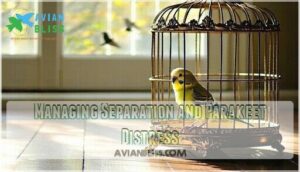This site is supported by our readers. We may earn a commission, at no cost to you, if you purchase through links.

You’ll notice your feathered friend becoming depressed, engaging in self-destructive behaviors like feather plucking, and developing a weakened immune system.
This creates a domino effect – stressed birds can’t fight off infections as well, making them vulnerable to illness that could prove fatal, acting like a slow poison rather than an instant threat.
Your parakeet’s naturally social nature means they’re hardwired for companionship, whether that’s another bird or quality time with you.
Understanding the signs and solutions can transform your pet’s wellbeing.
Table Of Contents
- Key Takeaways
- Can Parakeets Die of Loneliness?
- Alleviating Parakeet Loneliness and Boredom
- Duration of Time Parakeets Can Be Left Alone
- Managing Separation and Parakeet Distress
- Social Behavior and Loneliness in Parakeets
- Creating a Happy Home for Parakeets
- Frequently Asked Questions (FAQs)
- Can a parakeet die of sadness?
- Can a parakeet survive alone?
- Do budgies die of loneliness?
- Do parakeets get sad alone?
- Can budgies die of loneliness?
- Will a parakeet get lonely?
- How long can a parakeet stay alone?
- Can a parakeet live alone after one dies?
- How quickly can loneliness affect a parakeets health?
- Can parakeets form bonds with non-bird pets?
- Conclusion
Key Takeaways
- Your parakeet won’t die instantly from loneliness, but chronic isolation weakens their immune system and makes them vulnerable to infections that can be fatal.
- You’ll notice warning signs like feather plucking, appetite loss, excessive vocalization, and lethargy when your bird experiences separation stress.
- You shouldn’t leave your parakeet alone for more than 4-6 hours regularly, as extended isolation beyond 8-10 hours triggers serious behavioral problems.
- You can prevent loneliness by providing a companion bird, creating daily interaction routines, rotating toys weekly, and ensuring proper environmental enrichment.
Can Parakeets Die of Loneliness?
Looking at your parakeet’s bright eyes and curious chirps, you might wonder whether parakeet loneliness can actually be life-threatening.
While Fatal Loneliness isn’t typically a direct cause of death, chronic parakeet isolation effects can seriously compromise your bird’s health and well-being.
Parakeet social needs run deep since these birds naturally flock together in groups of 20 or more. When deprived of parakeet companionship, your feathered friend experiences significant stress that weakens their immune system.
Isolation Impact manifests through parakeet loneliness symptoms like decreased appetite, lethargy, and excessive vocalization – clear signs your bird is struggling emotionally.
Parakeet Depression creates a domino effect of health problems. Stressed birds become 30% more susceptible to respiratory infections and show reduced lifespans.
Solitude Effects include elevated cortisol levels that impact heart health and weaken disease resistance.
While Mortality Factors from loneliness aren’t immediate, prolonged isolation creates conditions where your parakeet becomes vulnerable to serious health complications that could prove fatal.
Alleviating Parakeet Loneliness and Boredom
When your parakeet shows signs of loneliness, you can take several effective steps to restore their happiness and prevent serious health issues.
Your lonely parakeet needs immediate attention and enrichment to prevent serious health complications.
The best solutions include providing a feathered companion and creating an enriching environment with toys, social interaction, and mental stimulation.
Providing Companionship
Getting your parakeet a parakeet friend is the most effective solution for parakeet loneliness.
Two males typically bond well through shared bonding activities, while females may prefer multiple companions.
If another parakeet isn’t possible, consider companion species that provide human interaction and meet your bird’s parakeet social needs.
Consult an avian professional for guidance on parakeet companionship options.
Puzzle toys can provide essential cognitive stimulation when social interaction is limited.
Stimulating Environment
While companionship helps combat parakeet loneliness, creating a stimulating environment provides essential mental enrichment.
Your bird’s wellbeing depends on engaging activities that prevent boredom and support parakeet mental health.
- Toy Rotation: Switch toys weekly to maintain novelty and interest
- Cage Enrichment: Add varied perches, swings, and climbing structures
- Sensory Stimulation: Include different textures, sounds, and colors
- Foraging Activities: Hide treats to encourage natural hunting behaviors
Novel experiences keep your parakeet’s mind sharp and reduce stress-related behaviors.
Owners should regularly replace interesting parakeet toys to keep their birds entertained.
Duration of Time Parakeets Can Be Left Alone
Most parakeets handle a standard workday alone without major issues, but Safe Alone Time shouldn’t exceed 4-6 hours regularly.
Beyond this threshold, Isolation Dangers like feather plucking and excessive vocalization emerge. While some Solitude Benefits exist—like encouraging independence—extended alone time triggers parakeet loneliness signs including appetite loss and lethargy.
Understanding a parakeet’s individual preferences is key to gauging their comfort. For periods exceeding 8 hours, Precautions Needed include enrichment toys and background noise.
When planning trips lasting 24+ hours, arrange Caretaker Visits to prevent severe isolation stress.
Managing Separation and Parakeet Distress
When you leave your parakeet alone, it’s easy to worry they’ll throw a feathered tantrum or get lonely.
Learning to spot stress and knowing how to comfort your bird can make separations a lot less dramatic for both of you.
Recognizing Signs of Stress
Three key warning signs reveal when your parakeet’s struggling with separation stress.
Vocalization changes like excessive screaming or sudden silence often signal distress first.
Watch for these critical parakeet behavior changes:
- Feather plucking or excessive preening indicating anxiety
- Appetite loss and noticeable weight changes
- Lethargy signs like reduced activity or constant sleeping
- Aggressive behavior toward you or cage accessories
- Social withdrawal from previously enjoyed interactions
Recognizing these parakeet depression signs early helps protect your bird’s parakeet wellbeing and prevents serious health complications from developing.
Alleviating Separation Stress
When your feathered friend faces separation anxiety, prioritize companion bonding before departing.
Provide new toys and enrichment activities to combat parakeet depression signs.
Environmental stimulation through window placement or nature sounds supports emotional well-being.
These parakeet enrichment activities address parakeet interaction needs, ensuring ideal parakeet wellbeing during your absence.
Consider offering varied safe chewing options to keep them entertained.
Social Behavior and Loneliness in Parakeets
Wild parakeets master flock dynamics through hundreds of social interactions daily, but your pet faces a different reality.
These social creatures depend on constant vocal communication and group bonding to thrive. When forced into isolation, behavioral changes emerge quickly—from excessive calling to withdrawn silence.
Solitude effects can trigger depression-like symptoms as your bird loses essential flock connections. Without proper companionship, loneliness becomes a serious health concern.
However, understanding your parakeet’s social behavior helps you recognize warning signs early. Cognitive enrichment through interaction partially fills this social void, though it can’t completely replace another bird’s presence.
Smart owners balance their pet’s natural instincts with realistic home environments.
Creating a Happy Home for Parakeets
You’ll want to set up your parakeet’s living space thoughtfully since a well-designed home directly impacts their mental and physical health.
The right cage setup combined with daily interaction creates the foundation for preventing loneliness and keeping your feathered friend thriving.
Housing Considerations
Your parakeet’s home setup directly impacts their wellbeing and stress levels. Choose a cage size that allows full wing stretches—width matters more than height.
Include perch variety with different textures and diameters to prevent foot problems. Position the cage in a safe location away from drafts but near family activity.
Environmental enrichment through toy rotation keeps boredom at bay, while background music combats loneliness during your absence. Regular toy rotation can also provide powerful cognitive stimulation for your bird.
Daily Interaction
Beyond proper housing, your parakeet needs regular engagement to stay mentally healthy.
These social creatures thrive on daily interaction that mirrors their natural flock behavior.
Here’s how to build meaningful connections:
- Talk and sing to your bird throughout the day – they’ll often chirp back
- Offer supervised playtime outside the cage for 30-60 minutes daily
- Teach simple tricks using positive reinforcement and treats
- Share gentle affection through head scratches and proximity bonding
This interaction frequency prevents loneliness while strengthening your companionship bond. Consider using a specialized training perch to facilitate these sessions.
Frequently Asked Questions (FAQs)
Can a parakeet die of sadness?
Yes, parakeets can die from sadness and loneliness.
Chronic isolation weakens their immune system, increases stress hormones, and can reduce their lifespan by 20%.
You’ll need to provide companionship or daily interaction to prevent this, as loneliness can have severe effects on their health.
Can a parakeet survive alone?
Like a ship without an anchor, your parakeet can technically survive alone but won’t truly thrive.
They’ll experience loneliness, stress, and potential health issues without companionship or significant daily interaction from you.
Do budgies die of loneliness?
Chronic loneliness can indeed be fatal for budgies due to severe psychological distress. You’ll see signs like feather plucking, appetite loss, and lethargy before serious health complications develop.
Do parakeets get sad alone?
Your feathered friend isn’t just being dramatic—parakeets absolutely get sad when left alone. They’re wired for social connection, and isolation can trigger depression, behavioral problems, and serious health issues.
Can budgies die of loneliness?
Budgies can indeed die from loneliness, though it’s typically due to severe psychological distress leading to weakened immunity and health complications. You’ll want to provide companionship or daily interaction.
Will a parakeet get lonely?
Yes, your parakeet will get lonely.
These social birds naturally live in flocks and need constant interaction.
Without companionship from another bird or significant daily human attention, they’ll develop stress, depression, and health problems that can seriously impact their wellbeing.
How long can a parakeet stay alone?
Your parakeet can handle a normal workday alone but shouldn’t be left for more than eight to ten hours regularly.
For trips lasting two or more days, you’ll need a trustworthy caretaker to provide social interaction and prevent loneliness-related stress.
Can a parakeet live alone after one dies?
Can birds really bounce back from such heartbreak?
Your parakeet can survive losing its companion, but you’ll need to provide extra attention, new toys, and consider getting another friend to prevent loneliness-related health issues.
How quickly can loneliness affect a parakeets health?
Loneliness can impact your parakeet’s health within just days to weeks.
You’ll notice behavioral changes like excessive vocalization, feather plucking, and decreased appetite appearing quickly, while immune system weakening develops over time.
Can parakeets form bonds with non-bird pets?
Murphy, a lonely cockatiel, found friendship with Max the golden retriever—they’d nap together daily, sharing quiet companionship that brightened both their lives.
While parakeets can’t truly bond with non-bird pets, they’ll often enjoy supervised interactions with gentle cats or dogs, providing mild social enrichment.
Conclusion
Remember when you first brought your parakeet home, wondering about their happiness?
Now you understand that will a parakeet die of loneliness explained isn’t just about survival—it’s about creating a thriving companion.
Your bird’s wellbeing depends on consistent social interaction, mental stimulation, and recognizing early stress signals.
Whether through another feathered friend or dedicated daily bonding time, you’re equipped to prevent loneliness from becoming a health threat.








